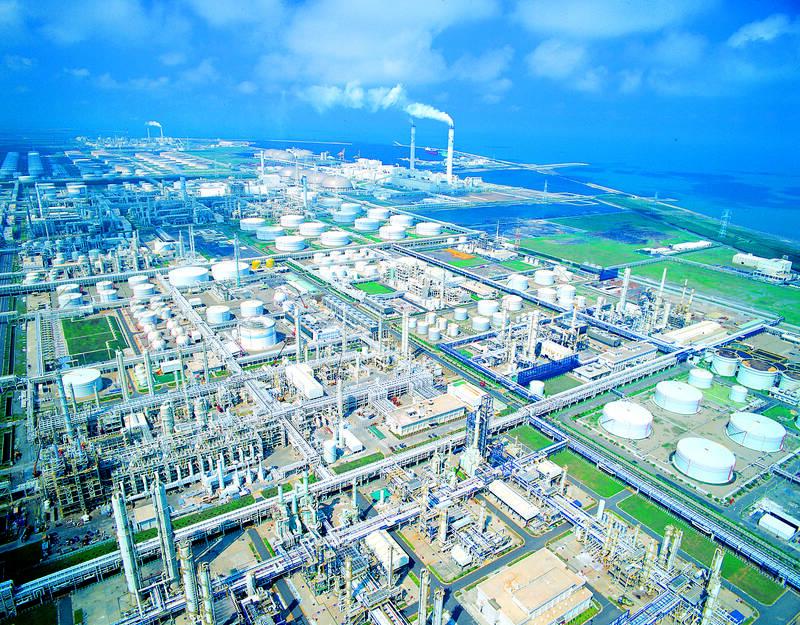The four major units of Formosa Plastics Group (FPG, 台塑集團), the nation’s largest industrial conglomerate, on Wednesday reported their net profits last quarter all fell from the previous quarter due to a decrease in non-operating income and the impact of foreign exchange losses.
This quarter, the four units — Formosa Plastics Corp (台灣塑膠), Nan Ya Plastics Corp (南亞塑膠), Formosa Chemicals and Fibre Corp (台灣化學纖維) and Formosa Petrochemical Corp (台塑石化) — are expected to see their operations affected by low oil prices and weak seasonal demand for oil products, analysts said.
Factors such as soft petrochemical demand amid a slow China recovery, disruption during the Lunar New Year holiday and fierce market competition amid new capacity ramp-up in foreign markets would also weigh on the units’ business performance, they added.

Photo: Taipei Times File Photo
“In the mid-to-long term, we anticipate a weak demand recovery overall, given persistent sector oversupply as China and the US continue to ramp up new capacity,” Yuanta Securities Investment Consulting Co (元大投顧) analysts said in a research note on Thursday. “For this year, with demand to recover as inventory adjustment ends, we expect Formosa Plastics, Nan Ya Plastics and Formosa Chemicals to see sales and earnings improve. However, carbon fee levies from this year will negatively impact earnings.”
During the October-to-December quarter, Formosa Plastics swung into a net loss of NT$2.88 billion (US$92.52 million) due to annual maintenance and demand weakness, as well as narrower investment gains, while Nan Ya Plastics saw its net profit contract 96.8 percent sequentially to NT$140 million on fewer investment gains and higher foreign exchange losses, the companies said in separate regulatory filings.
Formosa Chemicals’ net profit plunged 99.2 percent quarter-on-quarter to NT$574 million, hit by weakened demand and oversupply in China, coupled with narrower investment gains. Formosa Petrochemical’s net profit also fell 91.7 percent to NT$1.43 billion in the past quarter, given a slump in oil prices, narrower refinery and olefin product spreads, and inventory impairment and foreign exchange losses, their filings showed.
The FPG units posted a combined net profit of NT$44.01 billion last year, down 51.2 percent from a year earlier, as their operating income turned from profit to loss amid a negative macroeconomic environment that led to lower product prices and smaller sales volumes.
The four units' combined operating profit plunged 82.7 percent year-on-year to NT$58.96 billion, while revenue fell nearly 18 percent to NT$1.83 trillion compared with a year earlier.
Formosa Plastics, the group’s flagship company, reported its net profit last year fell 79.7 percent from the previous year to NT$7.35 billion, or earnings per share (EPS) of NT$1.15, and Nan Ya Plastics, the nation’s largest plastics maker, saw its net profit drop 80.4 percent to NT$6.31 billion, or EPS of NT$0.8.
Formosa Chemicals, which manufactures aromatics and styrenics, said its net profit grew 15.3 percent to NT$8.49 billion, or EPS of NT$1.45.
Formosa Petrochemical, the nation’s only listed oil refiner, reported its net profit rose 51.6 percent to NT$21.86 billion, or EPS of NT$2.3.

TAKING STOCK: A Taiwanese cookware firm in Vietnam urged customers to assess inventory or place orders early so shipments can reach the US while tariffs are paused Taiwanese businesses in Vietnam are exploring alternatives after the White House imposed a 46 percent import duty on Vietnamese goods, following US President Donald Trump’s announcement of “reciprocal” tariffs on the US’ trading partners. Lo Shih-liang (羅世良), chairman of Brico Industry Co (裕茂工業), a Taiwanese company that manufactures cast iron cookware and stove components in Vietnam, said that more than 40 percent of his business was tied to the US market, describing the constant US policy shifts as an emotional roller coaster. “I work during the day and stay up all night watching the news. I’ve been following US news until 3am

UNCERTAINTY: Innolux activated a stringent supply chain management mechanism, as it did during the COVID-19 pandemic, to ensure optimal inventory levels for customers Flat-panel display makers AUO Corp (友達) and Innolux Corp (群創) yesterday said that about 12 to 20 percent of their display business is at risk of potential US tariffs and that they would relocate production or shipment destinations to mitigate the levies’ effects. US tariffs would have a direct impact of US$200 million on AUO’s revenue, company chairman Paul Peng (彭雙浪) told reporters on the sidelines of the Touch Taiwan trade show in Taipei yesterday. That would make up about 12 percent of the company’s overall revenue. To cope with the tariff uncertainty, AUO plans to allocate its production to manufacturing facilities in

COLLABORATION: Given Taiwan’s key position in global supply chains, the US firm is discussing strategies with local partners and clients to deal with global uncertainties Advanced Micro Devices Inc (AMD) yesterday said it is meeting with local ecosystem partners, including Taiwan Semiconductor Manufacturing Co (TSMC, 台積電), to discuss strategies, including long-term manufacturing, to navigate uncertainties such as US tariffs, as Taiwan occupies an important position in global supply chains. AMD chief executive officer Lisa Su (蘇姿丰) told reporters that Taiwan is an important part of the chip designer’s ecosystem and she is discussing with partners and customers in Taiwan to forge strong collaborations on different areas during this critical period. AMD has just become the first artificial-intelligence (AI) server chip customer of TSMC to utilize its advanced

Six years ago, LVMH’s billionaire CEO Bernard Arnault and US President Donald Trump cut the blue ribbon on a factory in rural Texas that would make designer handbags for Louis Vuitton, one of the world’s best-known luxury brands. However, since the high-profile opening, the factory has faced a host of problems limiting production, 11 former Louis Vuitton employees said. The site has consistently ranked among the worst-performing for Louis Vuitton globally, “significantly” underperforming other facilities, said three former Louis Vuitton workers and a senior industry source, who cited internal rankings shared with staff. The plant’s problems — which have not